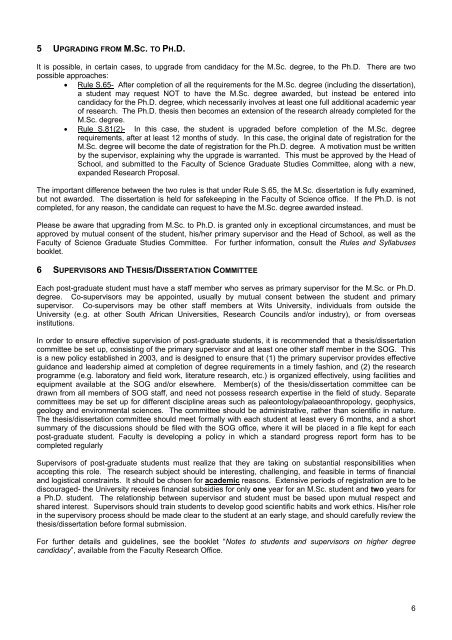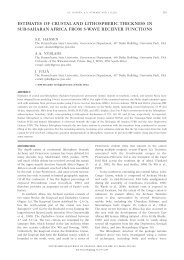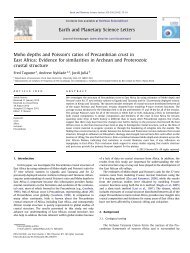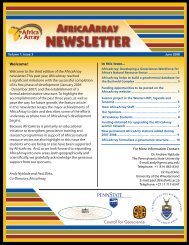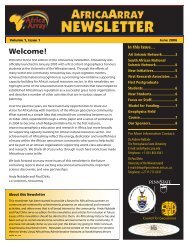School of Geosciences University of the Witwatersrand - AfricaArray
School of Geosciences University of the Witwatersrand - AfricaArray
School of Geosciences University of the Witwatersrand - AfricaArray
You also want an ePaper? Increase the reach of your titles
YUMPU automatically turns print PDFs into web optimized ePapers that Google loves.
5 UPGRADING FROM M.SC. TO PH.D.<br />
It is possible, in certain cases, to upgrade from candidacy for <strong>the</strong> M.Sc. degree, to <strong>the</strong> Ph.D. There are two<br />
possible approaches:<br />
• Rule S.65- After completion <strong>of</strong> all <strong>the</strong> requirements for <strong>the</strong> M.Sc. degree (including <strong>the</strong> dissertation),<br />
a student may request NOT to have <strong>the</strong> M.Sc. degree awarded, but instead be entered into<br />
candidacy for <strong>the</strong> Ph.D. degree, which necessarily involves at least one full additional academic year<br />
<strong>of</strong> research. The Ph.D. <strong>the</strong>sis <strong>the</strong>n becomes an extension <strong>of</strong> <strong>the</strong> research already completed for <strong>the</strong><br />
M.Sc. degree.<br />
• Rule S.81(2)- In this case, <strong>the</strong> student is upgraded before completion <strong>of</strong> <strong>the</strong> M.Sc. degree<br />
requirements, after at least 12 months <strong>of</strong> study. In this case, <strong>the</strong> original date <strong>of</strong> registration for <strong>the</strong><br />
M.Sc. degree will become <strong>the</strong> date <strong>of</strong> registration for <strong>the</strong> Ph.D. degree. A motivation must be written<br />
by <strong>the</strong> supervisor, explaining why <strong>the</strong> upgrade is warranted. This must be approved by <strong>the</strong> Head <strong>of</strong><br />
<strong>School</strong>, and submitted to <strong>the</strong> Faculty <strong>of</strong> Science Graduate Studies Committee, along with a new,<br />
expanded Research Proposal.<br />
The important difference between <strong>the</strong> two rules is that under Rule S.65, <strong>the</strong> M.Sc. dissertation is fully examined,<br />
but not awarded. The dissertation is held for safekeeping in <strong>the</strong> Faculty <strong>of</strong> Science <strong>of</strong>fice. If <strong>the</strong> Ph.D. is not<br />
completed, for any reason, <strong>the</strong> candidate can request to have <strong>the</strong> M.Sc. degree awarded instead.<br />
Please be aware that upgrading from M.Sc. to Ph.D. is granted only in exceptional circumstances, and must be<br />
approved by mutual consent <strong>of</strong> <strong>the</strong> student, his/her primary supervisor and <strong>the</strong> Head <strong>of</strong> <strong>School</strong>, as well as <strong>the</strong><br />
Faculty <strong>of</strong> Science Graduate Studies Committee. For fur<strong>the</strong>r information, consult <strong>the</strong> Rules and Syllabuses<br />
booklet.<br />
6 SUPERVISORS AND THESIS/DISSERTATION COMMITTEE<br />
Each post-graduate student must have a staff member who serves as primary supervisor for <strong>the</strong> M.Sc. or Ph.D.<br />
degree. Co-supervisors may be appointed, usually by mutual consent between <strong>the</strong> student and primary<br />
supervisor. Co-supervisors may be o<strong>the</strong>r staff members at Wits <strong>University</strong>, individuals from outside <strong>the</strong><br />
<strong>University</strong> (e.g. at o<strong>the</strong>r South African Universities, Research Councils and/or industry), or from overseas<br />
institutions.<br />
In order to ensure effective supervision <strong>of</strong> post-graduate students, it is recommended that a <strong>the</strong>sis/dissertation<br />
committee be set up, consisting <strong>of</strong> <strong>the</strong> primary supervisor and at least one o<strong>the</strong>r staff member in <strong>the</strong> SOG. This<br />
is a new policy established in 2003, and is designed to ensure that (1) <strong>the</strong> primary supervisor provides effective<br />
guidance and leadership aimed at completion <strong>of</strong> degree requirements in a timely fashion, and (2) <strong>the</strong> research<br />
programme (e.g. laboratory and field work, literature research, etc.) is organized effectively, using facilities and<br />
equipment available at <strong>the</strong> SOG and/or elsewhere. Member(s) <strong>of</strong> <strong>the</strong> <strong>the</strong>sis/dissertation committee can be<br />
drawn from all members <strong>of</strong> SOG staff, and need not possess research expertise in <strong>the</strong> field <strong>of</strong> study. Separate<br />
committees may be set up for different discipline areas such as paleontology/palaeoanthropology, geophysics,<br />
geology and environmental sciences. The committee should be administrative, ra<strong>the</strong>r than scientific in nature.<br />
The <strong>the</strong>sis/dissertation committee should meet formally with each student at least every 6 months, and a short<br />
summary <strong>of</strong> <strong>the</strong> discussions should be filed with <strong>the</strong> SOG <strong>of</strong>fice, where it will be placed in a file kept for each<br />
post-graduate student. Faculty is developing a policy in which a standard progress report form has to be<br />
completed regularly<br />
Supervisors <strong>of</strong> post-graduate students must realize that <strong>the</strong>y are taking on substantial responsibilities when<br />
accepting this role. The research subject should be interesting, challenging, and feasible in terms <strong>of</strong> financial<br />
and logistical constraints. It should be chosen for academic reasons. Extensive periods <strong>of</strong> registration are to be<br />
discouraged- <strong>the</strong> <strong>University</strong> receives financial subsidies for only one year for an M.Sc. student and two years for<br />
a Ph.D. student. The relationship between supervisor and student must be based upon mutual respect and<br />
shared interest. Supervisors should train students to develop good scientific habits and work ethics. His/her role<br />
in <strong>the</strong> supervisory process should be made clear to <strong>the</strong> student at an early stage, and should carefully review <strong>the</strong><br />
<strong>the</strong>sis/dissertation before formal submission.<br />
For fur<strong>the</strong>r details and guidelines, see <strong>the</strong> booklet “Notes to students and supervisors on higher degree<br />
candidacy”, available from <strong>the</strong> Faculty Research Office.<br />
6


